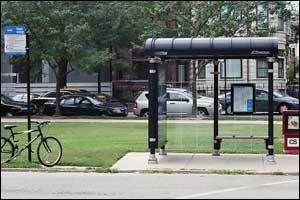Did You Know?
Impacts of the transit shutdown

At the end of May and in early June, in an unprecedented move, the City of Chicago and transit agencies decided to halt all its bus and train service with little to no warning for people around the city.
To get a better understanding of what happens when a transit system suddenly stops providing its crucial service, Active Transportation Alliance collected stories from residents on how the shutdown affected their lives.
Responses came from a wide range of people—from nurses to gas station workers, to protesters and people just trying to get to the grocery store. Here are some of the stories they shared (some people preferred not to be identified).
- A CTA rider who works at a gas station shared their experience of being on a CTA bus as the shutdown started. The bus driver pulled over, turned off the bus, and ordered passengers to get off. The rider had to walk to work, and was unable to use Uber or Lyft due to being undocumented and unbanked. It was 3 miles each way to and from work.
- “I am disabled and it is difficult for me to manage many downtown CTA stations as is,” said one person. “I was supposed to see my family in the suburbs for the first time in months. Due to the loop being closed, I could not switch trains to get to the orange line.”
- “The day after the protests happened, all the trains around my apartment were completely closed and I had to take a Lyft to work every day, $26 per day, which is not affordable,” said Francesca Downs.
- “I worked four long shifts starting the Saturday when the shutdown happened, and three additional days when CTA shut down,” said a transit rider who works in the healthcare field. “It is a full-service hospital. A lot of my co-workers depend on public transit. It affected them and increased everyone’s stress level. We were waiting to try to see who could make it and who could not. It was difficult to get in and out of downtown no matter how you were travelling, but those reliant on CTA were even more inconvenienced. Everyone was going home late [or] not knowing if we can go home at all.”
- “The only way to reach my mother, who is almost 95 and who lives independently, was to ride my bike 25 miles and back,” said one CTA rider.
- Mitchell Ward and their partner were actively involved in the protests, and to them it seemed like the city was finding ways to segregate and separate the protesters to oppose them. In addition to breaking apart the large groups of protesters, to Mitchell it seemed like the city wanted to put the blame of the shutdown on the protesters. They were not pleased with the response of the Mayor. “When you shut down the CTA, you are directly affecting people who do not have car, most of which are low-income. Shutting down CTA as a response to people advocating for Black lives, it’s directly inconsiderate.”
- One rider said that shutting down transit and trying to justify it for “the safety of riders and employees” was insulting and was an infringement upon peoples’ right to protest. She said it was very clear that the reason transportation was shut down was to try to stop people from protesting. The rider said it was very alarming situation for a friend who was downtown when all the bridges were raised and a curfew was set to start in 30 minutes. She said it could have been a dangerous situation for them and the way that the curfew was imposed seemed like it was meant to trap people downtown.
- One rider said her roommate had no way to get to work since the buses were not running. The roommate’s boss told her she still had to come in, and the roommate ended up having to walk 3 miles to work.
- “I am an ICU nurse who relies on public transportation to get from the far north side of Chicago to get to work. I don’t have a car, and don’t plan on getting one. The shutdown meant that I, an ‘essential’ worker, could not get to my job where people rely on me to be present, be timely, and provide quality life-saving care.”
We share these stories of the impacts of the transit shutdown of 2020 because they illustrate how essential our transit system is for the people of Chicago every single day.
The decision to shut down transit with little notice prevented people from taking needed trips and showed no regard for those who rely on the system for their everyday essential needs.
This post was written by Rylen Clark, Bus Organizing Fellow at the Active Transportation Alliance, based off the interviews they conducted with survey respondents.
Make a Donation
Your tax-deductible donation supports the important work that Active Trans does throughout the region
